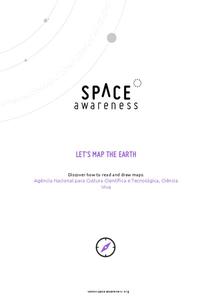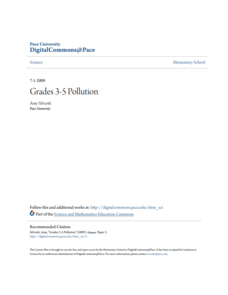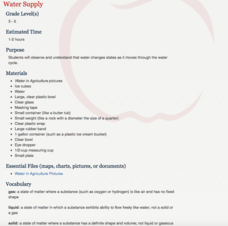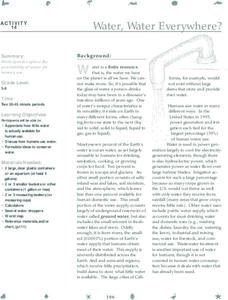media.yurisnight.net
Science Lesson Plan: Our Solar System: I Wonder?
Ever wonder why Pluto isn't considered a planet? Or how large the Earth is compared to the other inner planets? Explore the universe with a series of projects that simulate different aspects of our solar system. The activities require...
Baylor College
Modeling Earth's Atmosphere
Life on Earth is made possible by the unique composition of its atmosphere. Working collaboratively, a scale model is created as young scientists learn about the different layers of gas that surround the planet. Cards are included that...
Institute of Electrical and Electronics Engineers
Shake it up with Seismographs!
Shake things up in your STEM or earth science classroom when you have small groups construct their own seismographs. A reading assignment on the history of seismographs, the Richter scale, and current technology sets the stage for the...
Signing Time Foundation
What is the Water Cycle?
Dive into an exploration of the water cycle cycle with this simple earth science lesson. After first discussing where rain comes from, young scientists define the terms condensation, evaporation, transpiration, and precipitation as a...
National Wildlife Federation
The Water Cycle
Observe the water cycle from the comfort of your classroom with this excellent earth science experiment. Working collaboratively, young scientists first create terrariums complete with hills, plants, lakes, and an atmosphere,...
World Wildlife Fund
Land of the Midnight Sun
From days of 24 hour sunlight, to endless nights that last for days, the Arctic is a very unique place to live. Examine the seasonal changes that occur in the northern-most reaches of the globe and the impact they have on the plants and...
Earth Day Network
Conserving Water Through Art!
Having fresh, clean drinking water is a privilege many people take for granted. Help raise awareness about the scarcity of water and the importance of conservation by discussing different ways water is used in everyday life. Brainstorm...
American Forest Foundation
Who Speaks for the Trees?
Help young conservationists appreciate the important role that trees play in ecosystems around the world with this collection of six engaging activities. From a shared reading and class discussion of Dr. Seuss' The Lorax, to in an depth...
NOAA
The Cycle of Water
Help young scientists get to the bottom of the water cycle with this comprehensive earth science lesson. After first viewing and discussing presentations about the states of water and the water cycle, the class performs a series of...
Baylor College
Fossil Fuels and the Carbon Cycle
Humans are quickly depleting Earth's fossil fuels and locating them is becoming increasingly difficult! Layered muffins are used for models as young geologists take core samples in order to determine the presence of oil. Consider first...
NASA
Soda Straw Rockets
Three, two, one, blast off to a better understanding of force and motion with this exciting science lesson! Beginning with a discussion about rockets and gravity, young scientists go on to complete a series of worksheets about net forces...
Institute of Electrical and Electronics Engineers
Solar Structures
It's time to soak up the sun! Youngsters read about active and passive solar heating systems, then they collaborate to create a miniature solar-heated building. Provide a variety of materials for them to incorporate and watch their...
Space Awareness
Let's Map the Earth
Before maps went mobile, people actually had to learn how to read maps. Pupils look at map elements in order to understand how to read them and locate specific locations. Finally, young cartographers discover how to make aerial maps.
University of Waikato
Māui and the Sun
Using a Maori legend, How Maui Tamed the Sun, youngsters are introduced to the importance of sunlight to civilization. Teach them about nuclear fusion that occurs to produce the solar energy we later receive on Earth as electromagnetic...
NOAA
An Ocean of Energy
Young biologists trace the path of the sun's energy through marine ecosystems in the second part of this four-lesson series. Building on prior knowledge about producers, consumers, and decomposers students are introduced to the concept...
Education Outside
Our Water Planet
Fresh water is a precious resource. Most kids don't realize how little of the water on Earth is actually drinkable. This lesson will help to illuminate them on this important topic. They discus the ratio of water to land, where most...
Centers for Ocean Sciences
Ocean and Great Lakes Literacy: Principle 1
Is your current lesson plan for salt and freshwater literacy leaving you high and dry? If so, dive into part one of a seven-part series that explores the physical features of Earth's salt and freshwater sources. Junior hydrologists...
NASA
Natural Resources on Earth
Natural resources do not always occur so naturally. Lead classes through a thorough set of lessons investigating the natural resources important for plants. Learners complete a series of worksheets as they explore the information and...
National Wildlife Federation
Summer Midnight Sun
Sunlight hours and climate have a clear connection. Young researchers collect data about the sunrise and sunset times in an Arctic climate as well as the average temperatures. They then graph their data to make connections between the...
Pace University
Pollution
Over the course of 10 days, scholars take a pre-assessment to place them in one of three leveled groups. Whole-class and in small groups, pupils take part in read-alouds, field trips, hands-on activities, and complete learning contracts...
NASA
Let's Investigate Mars
Take your science class on a hypothetical field trip to Mars with an engaging astronomy lesson. After first learning about NASA's Mars rover missions, young scientists plan their own scientific investigations of Earth's nearest neighbor.
National Institute of Food and Agriculture
Water Supply
Participate in three activities that look at the earth's limited water supply and the changes water goes through as it enters each phase of the water cycle. The resource is complete with three activities that demonstrate the changing...
US Geological Survey
Water, Water, Everywhere?
Less than one percent of the earth's water is available for human use. A hands-on activity models the phenomenon for young scientists. Beginning with a specific volume of water, learners remove water that correlates to the percent of...
California Academy of Science
Modeling Eclipses with Size and Distance Scales
Size within the solar system is a difficult thing for pupils to imagine. Using everyday objects, they build models to show the scale between the sun, moon, and Earth. They situate their props in proportional distances between the objects...
Other popular searches
- Earth Science Moon Phases
- Branches of Earth Science
- Earth Science Minerals
- Earth Science Inquiry
- Earth Science Lesson
- Earth Science Lesson Plans
- Basic Earth Science
- And Earth Science
- Earth Science Map Reading
- Earth Science and Art
- Earth Science Vocabulary
- Science Earth Layers
























